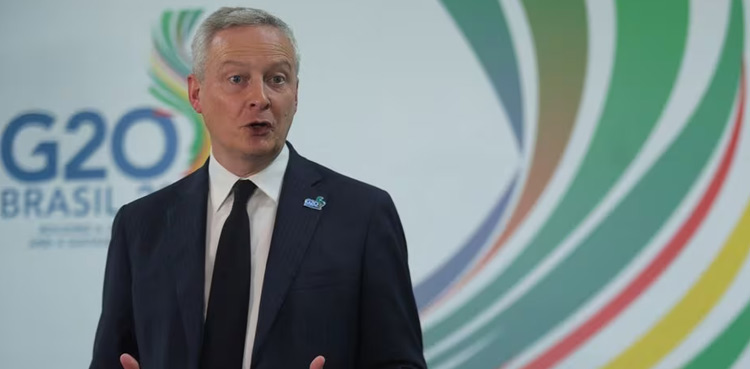
SAO PAULO: French Finance Minister Bruno Le Maire on Wednesday publicly challenged US Treasury Secretary Janet Yellen’s view that it would be legal to monetize some $300 billion in frozen Russian assets, revealing deep divisions among Group of Seven countries.
Le Maire, speaking after a G7 finance officials meeting, rejected the US position and said France was convinced there was no sufficient basis in international law to proceed, and further work was required.
He said any such moves should be fully underpinned by international law and required the support of all members of the Group of 20 major economies, which include Russia, China and other countries that have been critical of the United States.
G7 officials have been struggling for a year to agree on what to do with Russian sovereign assets immobilized after Moscow’s invasion of Ukraine in February 2022. G7 leaders have asked for possible solutions by June.
Their debate this week on the sidelines of a meeting of finance ministers from the G20 major global economies in Sao Paulo showed there is still a fair distance to cover.
“It’s not necessarily a confrontation. We’re continuing discussions behind-the-scenes towards a common purpose, which is to seek measures that align with international law,” Japan’s vice finance minister for international affairs, Masato Kanda, told reporters after the G7 ministers’ meeting.
On Tuesday, Yellen told reporters there was “a strong international law, economic and moral case” for deriving value from the Russian assets, either seizing them outright or using them as collateral, and the “countermeasures theory” justified such action under international law.
Yellen cited urgent need to help Ukraine after military setbacks in its two-year battle against Russia’s invasion.
Le Maire, asked specifically about the countermeasures theory, said he disagreed.
“We don’t think this legal basis is sufficient,” he said. He said broad international consensus was needed.
“This legal basis must be accepted not only by the European countries, not only by the G7 countries, but by all the member states of the world community, and I mean by all the member states of the G20. We should not add any kind of division among the G20 countries,” he said.
Russia has threatened major retaliation if the West proceeds with seizing the assets.
Despite the public bickering, one Western official, who asked not to be quoted by name, said G7 officials were in strong agreement that Moscow should pay for the damage it had caused. The official noted a growing number of experts were confident there was a legal path to allow seizure of the frozen assets.
Le Maire argued that the European Union using windfall profits from the frozen assets already marked a significant step forward, a view echoed by German Finance Minister Christian Lindner.
Lindner told reporters he favored using the interest accrued from frozen Russian assets to support Ukraine in its war against Moscow, calling it a “realistic step that is legally secure and which can be implemented quickly.”
Washington supports the windfall tax idea, but argues more significant action is justified, given the egregious nature of Russia’s invasion.
Canada agreed on the urgent need to move forward with confiscating frozen Russian sovereign assets to help Ukraine, Finance Minister Chrystia Freeland said on Tuesday.
Kanda declined to comment on Japan’s stance, but said the windfall tax idea was likely gaining consent from the G7 and the broader international community.
“Whether to take further steps would be something that needs more discussion, including on what kind of steps are acceptable under international law,” Kanda said.
The issue has grown in importance since $61 billion in further US aid to Ukraine has been blocked by the Republican-led US House of Representatives.
Experts said it could take a year or more to unlock value from the assets. Most, if not all countries that hold Russian assets, would need to pass domestic legislation to make the actions possible.
On Tuesday, Yellen acknowledged there were risks, but downplayed concerns raised by some Europeans that seizing Russian assets would undermine the role of the US dollar, euro or Japanese yen as important global reserve currencies.
from ARY NEWS https://ift.tt/cUDvZ8d
via IFTTT

0 Comments